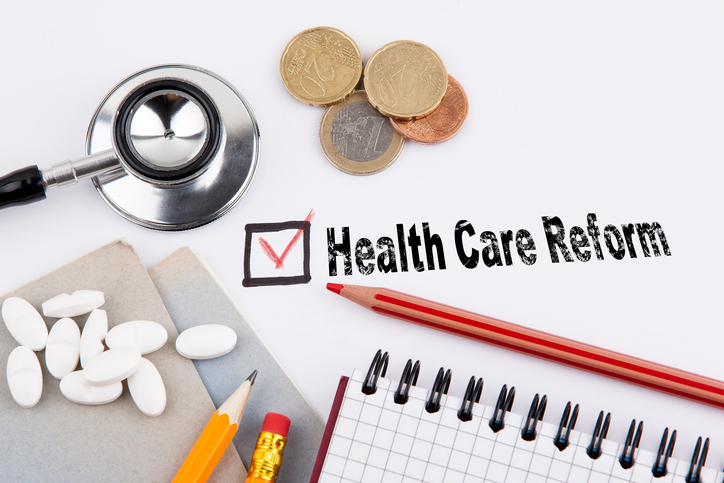The Republican Study Committee’s Health Care Task Force has proposed a set of bills in the U.S. House of Representatives that aim to improve hospital competition and advance health reform.
U.S. Reps. Kevin Hern (R-OK), Rick Allen (R-GA), and Victoria Spartz (R-IN) of the Task Force’s Affordability Subcommittee introduced five bills that would repeal Obamacare prohibitions on physician-owned hospitals, increase oversight of anticompetitive behavior, improve transparency in hospital billing practices, and review clauses in health care contracts that restrict competition, on June 16.
The proposals aim to reduce the cost of health care, Joel White, president of the Council for Affordable Health Coverage (CAHC), a health policy reform group, said in a statement.
There are five bills in total, the Flexibility in Hospital Ownership Act (H.R. 8132), the Oversight of Anti-Competitive Behavior of Non-Profit Hospitals Act (H.R. 8129), the Transparency of Hospital Billing Act, the Consumer Choice of Care Act (H.R 8133), and the Competition in State Healthcare Markets Act (H.R. 8130).
“To further promote competition, Congress should adopt these bills to set the right conditions for market rivalries,” said White. “The result could be electric, reducing the price of medical services and lowering premiums significantly.”
Private Coverage Preferred
A CAHP poll of voters found that regardless of political affiliation, people do not want their health care arrangements fundamentally changed but prefer improvements that would lead to better access, expanded coverage, and lower cost.
CAHP conducted three separate polls with the first one done in a focus group setting of 100 Virginia voters who voted for Joe Biden for President and Glenn Younkin for Governor. All participants were voters outside North Virginia.
Based on those results, CAHP polled 34 voters from around the country of not-so-strong Republicans and independents, who had health insurance and insurance coverage. The third poll, based on the previous results, surveyed 100 respondents, matched to the DataTrust voter file. The poll has a margin of error of plus or minus 3.1 percent.
The survey found 82 percent of all respondents were satisfied with their health care coverage, regardless of type. Job-based insurance accounted for 46 percent of those polled.
The poll found strong support for employment-based coverage. Forty-eight percent strongly supported making out-of-pocket costs tax deductible. Interestingly, respondents were in favor of price controls on prescription drugs (40 percent, strongly support) until they learned controls would lead to fewer treatments (23 percent, strongly support).
Incremental Reforms Supported
The survey results suggest voters do not want radical changes, says Gregg Girvan, research fellow at the Foundation for Research on Equal Opportunity.
“The polling results overall show there is an opening for health reform, but it is most likely to succeed if reform is incremental rather than replacing the existing system; for example, expanding coverage while leaving the employer-sponsored insurance system intact,” said Girvan.
Although the poll found 82 percent were satisfied with their coverage, 51 percent want to “keep the basics of the current health care system in place but make improvements where we can.”
Support for changes could indicate unexpressed dissatisfaction with their current coverage, says Girvan.
“The pollster seems to conclude the high level of satisfaction with insurance coverage is the main reason voters do not want fundamental changes to the system,” said Girvan. “That is certainly one plausible interpretation and lines up with other polling that indicates support for proposals like Medicare for All drops when people realize how their employer-sponsored plans are likely to be affected. …[However,] it signals underlying discontent with existing coverage that isn’t immediately obvious with polling that asks about general satisfaction with health coverage.”
The poll missed an opportunity to explore satisfaction further, says Girvan.
“The polling results don’t necessarily mean people think their coverage could not be better,” said Girvan. “Other polling suggests people are still worried about unexpected medical bills, the amount of their deductibles and other cost-sharing, and rising prescription drug costs, especially in light of recent concerns over inflation. These concerns signal possible discontent with available coverage options.”
Voters Support HSAs
The poll found that 42 percent trust Democrats on health care while 34 percent trust Republicans, and 25 percent weren’t sure, White told Health Care News.
“CAHC polling shows Americans do not believe Congress is addressing their health care priorities,” said White. “While lawmakers focus on government takeover of health care, they are ignoring that most Americans have coverage, and like it. A lot. Most get coverage through their employer and are concerned about rising health costs and want Congress to do something about it.”
The poll found voters support HSAs, regardless of party, says White.
“One idea with stratospheric bipartisan support is lowering out-of-pocket costs, like expanded use of health savings accounts,” said White. “Congress could easily make this a reality by updating HSA rules to allow more Americans access and expand how those accounts can be used.”
John Goodman, president of the Goodman Institute of Public Policy Research and co-publisher of Health Care News, says the solution is straightforward.
“People should be able to buy insurance that meets their financial and health care needs—as an alternative to the outrageous deductibles and unaffordable premiums in the Democrat-created health insurance exchange plans,” said Goodman. “People with serious health problems should be able to buy insurance that gives them access to the doctors they need—as an alternative to the narrow provider networks in the Democrat-created health insurance exchange plans.”
Ashley Bateman (bateman.ae@googlemail.com) writes from Virginia and AnneMarie Schieber (amschieber@heartland.org) is the managing editor of Health Care News.
Internet info:
Polling data, Council for Affordable Health Coverage, April 2022: https://static1.squarespace.com/static/58bf2243d482e99321a69178/t/628699e7b60cd62112102c42/1652988392332/CAHC%2BPolling+2022.pdf
This article was updated on August 4, 2022.
For more great content from Health Care News.
